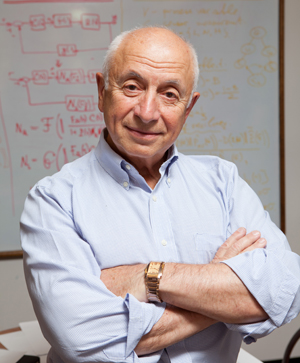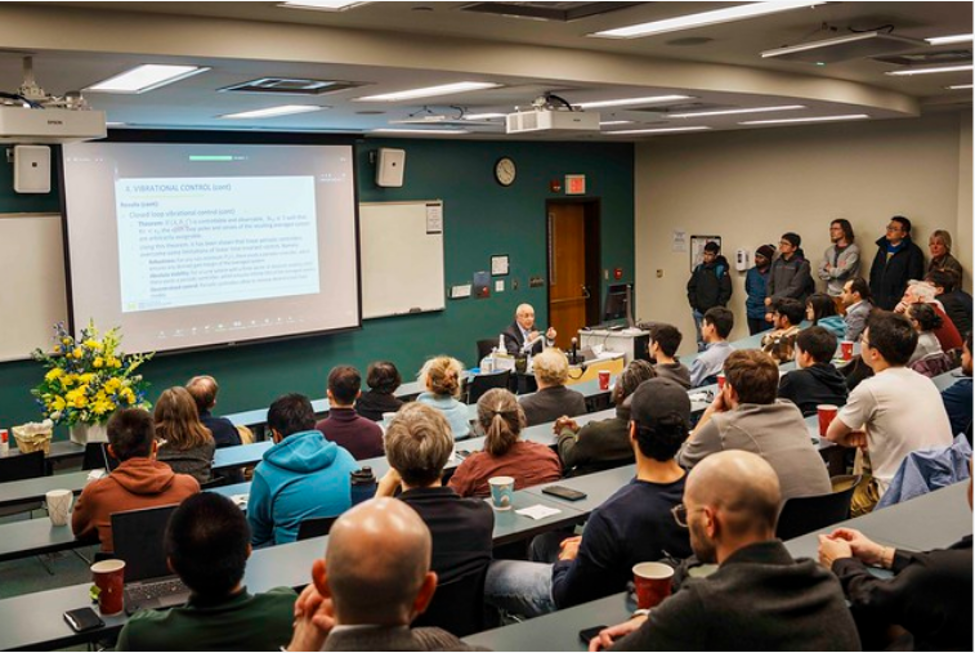Semyon Meerkov retires, and continues his work on Production Systems Engineering

Professor Semyon Meerkov stepped down January 3, 2024 from full time status as a professor after a professional career of 57 years, with 39 of those years at Michigan.
Professor Meerkov received an M.S.E.E. (1962) from the Polytechnic of Kharkov in Ukraine and a Ph.D. (1966) from the Institute of Control Sciences in Moscow, Russia. He served as Automation Engineer (1962-63) at the Research Institute for Power Systems Automation in Kharkov, Ukraine and as Research Fellow (1966-69) and Senior Research Fellow (1969-77) at the Institute of Control Sciences in Moscow, Russia. He joined the Illinois Institute of Technology in the Electrical Engineering Department as Associate Professor in 1979, and was promoted to Professor in 1982. He joined the University of Michigan as Professor in 1984.
Professor Meerkov’s research focused on systems and control, production systems engineering, communication networks, rational behavior, and resilient control systems. During his time at Michigan, he taught undergraduate courses on signals and systems, probability theory, and feedback control and graduate courses on nonlinear systems, nonlinear control, and new courses on Production Systems Engineering. He co-authored the first textbook in the field of production systems titled Production Systems Engineering (Springer 2009). This book is used in many countries throughout the world and received the Excellent Textbook Award for its 2012 Chinese translation.
Professor Meerkov also co-authored the book Quasilinear Control (Cambridge University Press 2011), which serves as the text for the graduate course Advanced Nonlinear Control. He published nearly 300 refereed journal publications and conference papers, seven of which earned best paper awards. He served as Editor-in-Chief of Mathematical Problems in Engineering (1995-2007), Department Editor for Manufacturing Systems of IISE Transactions (2002-2008) and Associate Editor of several other journals.
A devoted educator, Professor Meerkov was voted Eta Kappa Nu Professor of the Year in 1997 by the students themselves. He graduated 31 Ph.D. students, many of whom are distinguished professors around the world or leaders in industry.
As a member of the University of Michigan’s Faculty Senate, Professor Meerkov served in the Senate Assembly (2003-2006) and on the Senate Advisory Committee on University Affairs (2004-2007), helping to establish annual faculty evaluations of administrators, unit-shared governance in the College of Engineering, and university-wide shared governance. He was instrumental in creating a faculty fund for need-based scholarships. For his efforts, he received U-M’s Distinguished Faculty Governance Award (2008).
Professor Meerkov has held visiting positions at UCLA, Stanford, Technion (Israel), Tsighua (China) and Ben Gurion University (Israel), giving him the opportunity to share his insights into Production Systems Engineering throughout the world.
He is President of Smart Production Systems LLC, which promises to help automate managerial decision-making on the factory floor. Professor Meerkov co-founded the company in 2018 with his former graduate students Dr. Liang Zhang (Professor, University of Connecticut), and Dr. Pooya Alavian (Cloud Applications Architect, Microsoft).
The production systems engineering methods developed in his research group have been applied to dozens of production systems in large, mid-size, and small manufacturing organizations, including GM, Ford, Chrysler, Toyota, MillerCoors, Kraft Foods, Kroger, Lexmark, and others.
Professor Meerkov is a Life Fellow of IEEE and a Foreign Member of the Russian Academy of Sciences (2016).

On November 3, 2023, Prof. Meerkov was the speaker at the weekly Control Seminar Series (which he helped to establish in 1985). He offered the talk, “Research problems of my life: Overview and advice for the inspired.” Believing that basic ideas of any theory could be explained in under 5 minutes, he offered a survey of 10 different research problems he worked on over the years, followed by some advice to graduate students as inspired future researchers.